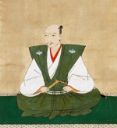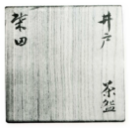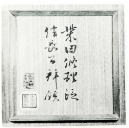Tea of the warriors
Sen no Rikyū served alongside and performed tea ceremonies for famous military leaders such as the warrior lords Oda Nobunaga (織田 信長, 1534–1582) and Toyotomi Hideyoshi (豐臣 秀吉, 1537 – 1598).
Rikyu’s tea ceremonies were embedded not only with the ideal of wabi, but also with Zen beliefs. The phrase “cha-zen ichimi”茶禪一味 , which was popular at the time, perfectly captures this concept of the tea ceremony: it means “tea and zen have the same flavour”. It is important to note that Zen, a specific sect of Buddhism, was extremely popular amongst the warrior elite, and supported the ideals of discipline, simplicity and highlighted the imperfection of life. [cf]
The tea ceremony was notably quite often connected to the sphere of politics, with tea ceremonies and tea meetings organized at the end of military campaigns as well as the military elite taking pride in the ownership of precious tea-related objects. The acquisition of famous tea objects was part of political strategies, as was gifting them amongst warriors and feudal lords. [cf]
Shibata was to be found in this context: in fact, once in Japan, the bowl ended up in the hands of none other than the Japanese warrior lord Oda Nobunaga, avid collector of tea objects. Nobunaga bestowed this tea bowl upon the feudal lord Shibata Katsuie (柴田勝家 , 1522 -1583), a warrior who was initially not a supporter of Nobunaga's power, but who pledged to serve him after 1556. Shibata took part in many battles alongside Nobunaga, and earned the nickname “Shibata the Demon” (Oni Shibata). [Cf]
The tea bowl took its name from Shibata Katsuie himself; the practice of giving individual names to objects was developed in the field of the tea ceremony from the mid-17th-century onwards. Named objects are known as meibutsu 名物 and their histories are recorded and celebrated, as are the objects themselves and their accessories, such as the wooden boxes they come in. [cf]
Unfortunately, it is not clear at what time in their relationship Nobunaga gifted this tea bowl to Shibata. However, the fact that two strong, powerful, military men perceived this simple bowl as an honourable and precious gift speaks volumes about the importance and meaning that this kind of object had in Japan.





